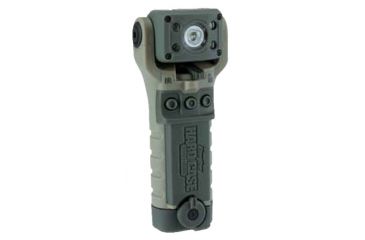For those of us on Northern Hemisphere daylight is becoming a more scarce resource. Besides a reduction of Vitamin D* we are also now visually impaired and not easily seen by others. Gotta stay safe: Need to
see and
be seen. Buying a lighting system is the type of purchase you want to get right the first time. Nothing is more expensive than buying something that you never use. Two reasons for lighting:
- Light your way
- Night Trail Running: There are typically no street lights on trails. Looking for a lighting system with more than 100 Lumens is a safe rule.
 |
| Black Diamond 80-100 Lumens |
Headlamps are a good solution. They leave your hands free and only cast light where you're looking. They can be inconvenient if you're used to wearing a hat, and the pressure on the forehead can take some getting used to. It would be nice if they were lined with a Richard Simmons terrycloth head band - alas, there always seems to be some plastic digging in to your forehead.
- Night Road Running: In the presence of some street lighting and possible traffic, it's more important to be seen by others. For this you'll need a handheld flashlight that you can point low, looking for road hazards and curbs and not blinding drivers or other pedestrians. A handheld is also appropriate for encountering other nighttime runners in populated areas. The major benefit of handheld is that they allow you to avert your lighting without having to avert your gaze. Another secret...keep one eye closed when around a car's headlights (and don't look directly into the headlights - no brainer?), this keeps the pupil in the closed eye big for better night vision later ;)
In the presence of nighttime traffic (even dusk), wearing reflective clothing and carrying battery powered glowsticks and blinking red lights all help you be more visible to the half-blind drivers out there. Quote from Evaluation of Reflective Vest Options
"Research on human perception (in motor vehicles) finds that drivers must first notice, and then identify, an object (in or near the roadway) in order to react to it (Beck2 2005, and Ashton 2007). Police uniforms are typically dark colored and even more difficult to see at night. The white shirt common among higher ranked officers does not add to their visibility in low light or nighttime conditions. Beck, citing research conducted in 1984, notes a driver at 30 miles per hour (mph) detects a subject in dark clothing at approximately 70 feet (giving the subject approximately 1.5 seconds to react). If the speed is 55 mph, the reaction time was under one second. Similar research by the University of Michigan Transportation Research Institute (as cited by Ashton 2007) concluded that in a simulated work zone, a driver detected a person in non-reflective clothing at 125 feet while they detected an individual in reflective clothing at 891 feet."

7 times further reaction distance is the difference between reflective and non-reflective clothing. That's pretty good odds for a low cost inVESTment. One ebay search shows as low as $5 could protect you.
Search here.
 |
| Flashlight with a pivot-able head |
Selecting a headlamp or flashlight (or as I do it, one each): Think about battery replacement (rechargeable or not), comfort, lighting-power, and ergonomics. When using a flashlight, the angle of your hand is important. Over time, pointing a flashlight can be an uncomfortable if you need to maintain an unnatural wrist angle. Knuckle lights, or an aim-able flashlight head can make things more comfortable.
 |
| Knuckle lights |
My solution, I wear a headlamp that has a blinking red light in the back and carry a stronger handheld. Because I'm a nerd I chose a 'programmable' flashlight. I can get it to blink fast to remind me to do pickups at time intervals, or blink slow to remind me to turn around and run home. If you're the type to think a programmable flashlight may be fun, here's an example of one:
 |
| www.hexbright.com |
Be safe. Buy quality stuff! Torches would be more paleo (and more fun for the pyros among us), but it just makes your neighbors a little suspicious. I'd love to hear what your lighting solutions are, what worked, and what did NOT work.
**The way to NOT be vitamin D* deficient (or A,E,K,etc) is high cholesterol diet rich in fats. Lead a fat burning lifestyle to get the most bang for your food buck.




